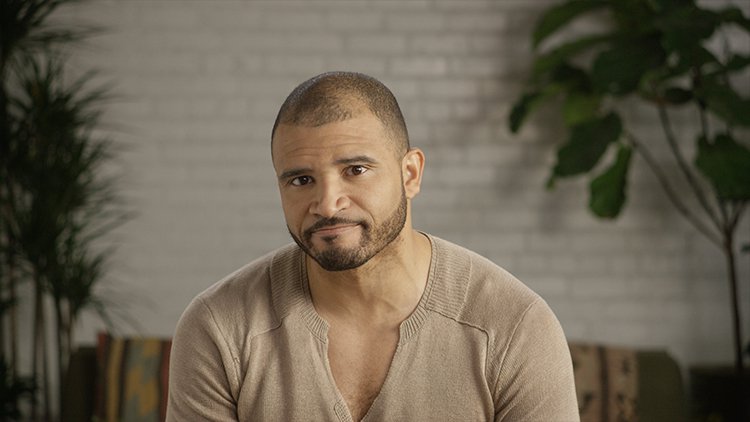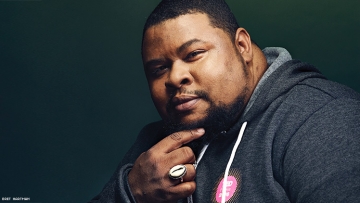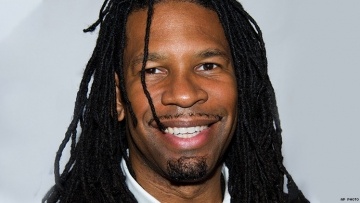Demarco Majors has led a charmed life. The former pro basketball player had just retired when he was discovered in a New York City bar by talent scouts who liked his “look,” and invited him to a music video shoot — that just happened to be for Beyoncé.
“Out of all the people that were there — these [25] guys were a part of some of the top modeling agencies in New York — and I was just this lone guy who had just got met at a bar,” he remembers. And it got better. “She made me the love interest.” That’s how Majors became the male lead in Beyoncé’s “Freakum Dress” video.
A few days later he’s mistaken for a professional model, which leads to him becoming one.
“Next thing you know… I’m in New York Fashion Week, walking for three top designers,” Majors says. “My life just sort of started steam rolling from there, from modeling to acting to writing.”
Before long he was starring in the Logo reality show Shirts & Skins (about the all-gay basketball team The Rock Dogs), then in the stage adaptation of James Earl Hardy’s bestselling novel B-Boy Blues. Then, he says, “I started doing some writing and I got to be in TV shows like Law and Order, and Blue Bloods. I did a short film called, Hello My Name Is Trouble. I was one of the leads in that film, and then all of a sudden, I decided to walk away.”
His sudden departure was a symptom of a much larger truth. Even Demarco Majors isn’t immune to the laws of science. What you put into something impacts what comes out. And what goes up, must come down. Majors’s meteoric rise was about to lead to an epic crash.
Majors, who grew up in poverty during the 1980s overcame childhood trauma to be recruited by the National Collegiate Athletic Association for his talents as a basketball player, nicknamed “The Helicopter” for his unique style of slam dunk. He then got to play in professional leagues around the world, and gay out while still playing — one of the few pro ballers to do so — garnering him a spot on the 2007 Out 100 list.
But a few short years later everything began to unravel.
A series of what Demarco calls “some very unfortunate things,” led to his being assaulted, becoming HIV-positive, and developing “a very nasty addiction to crystal meth.” And then, he says, “all these really bad things started happening to me.”
Majors was in a dark spot. But in the end, “those things didn’t destroy me,” he says. “They shaped me. They gave me an opportunity to really… turn my life around.”
Part of that turn around came through a 2017 interview with Plus magazine, in which Majors went public about his HIV — and everything else. But the interview almost didn’t happen. Majors feared he wasn’t ready for the world to know how far he’d fallen. But then, the night before the interview, he had a dream and it left him feeling like he was finally comfortable in his own shoes. He woke to the sound of a song. The title cinched it: “Letting Go.”
He did.
The reaction was overwhelmingly positive. He heard from people around the globe, many of whom told him that, because of him, they’d finally found the courage to get tested. Majors loves that feeling of helping other people, and now he gets to do it everyday.
Today Majors is a fitness trainer who “runs the flagship gym for Crunch Fitness in Northridge,” in Southern California, where the gym has over 17,000 active members. “I get to talk to people about health, wellness, nutrition, fitness, all day long after I finally let go of what was holding me back, after all these years — because I decided it’s my time,” Majors says.
His advice often comes directly from his own experience. For example, he says, “I’ve learned more about the nutrition part of it because, you know, when you’re 40 years old, your metabolism does not have the same ideas that you do. I had to learn how to have a better relationship with food. I never realized that I had an unhealthy relationship with food.”
Majors was once the kind of guy who would only eat two meals a day and rely on protein shakes to make up the difference. Now he realizes, that kind of diet puts your body “in starvation mode, because if you’re only eating once or twice per day, you’re not getting enough nutrients to the areas of your body for the goals that you have.”
These days he eats every two hours or six meals a day. What’s more, he pays careful attention to where his food is coming from; going so far as to visit farmer’s markets and get to know the folks who were raising the veggies he eats. Majors also cooks a lot, and likes to do it from scratch.
“I like to season my own food,” he explains. “I like to go to the store and I’ll grab, you know, a couple chicken breasts, and I like to cook them up. I like to make my own pasta from zucchini.”
That skill in the kitchen could be genetic. His grandmother cooked for a restaurant, his mom made meals that still have him drooling at the memory. His favorite: “My mom had the absolute best cream and mushroom smothered pork chops. Insane.” And his dad was an amazing chef too. “He would cook barbecue, Majors recalls. “People would come from — and mind you, my dad was a paraplegic — people would come from different states to bring him their meat in order for him to cook it for them.”
Majors shies away from packaged food today, arguing that “the chemicals in that food,” can interact poorly with antiretrovirals. “I have to take a pill every single day because of HIV. All these chemicals in our bodies cause an imbalance…. You’re not living the healthiest mentally, physically, emotionally or spiritually, because you’re always in an imbalance.”
Although he recognizes that people with HIV need to make sure they’re getting enough protein, Majors advises his positive clients to stay away from protein powder. “That can spike the proteins in your liver, which also can reflect in your numbers in between being undetectable and detectable. That could also end up, in the long run, changing your viral load, which could end up changing your medication.”
“It is very important to know what you are putting into your body,” Majors reiterates, because it can also impact your mental health. “You start with anxiety. You start with panic. You start with depression. You don’t even know where it’s coming from and you think it’s because of stress in your life, and it’s not the stress. It’s how your relationship to food starts, because you’re not taking care of your dietary needs. What are you really putting in yourself to allow the best you to be vibrant, to give to other people?”
His go to advice to help motivate someone who is dealing with chronic pain or lethargy? Majors likes to start by asking, “What is one personal goal that you have, something that you’ve always wanted? Because when you have a what, you’ll have a why to your what. You’ll create a new person. And your purpose doesn’t have to be some grand design. We’re trying to take the energy that you have within yourself to put back into the world, because you are not done fulfilling your purpose.”
“Being HIV-positive [sometimes] takes the positive out of you,” Majors admits. “You have to keep a positive mindset every single day, and your body will respond to your positivity. But if you’re not around people who you aspire to be, and keep that positive attitude, that’s when your body starts responding in a negative way.”
Nutrition tips for those living with HIV
Eat more frequently. “If you’re only eating once or twice per day, you’re not getting enough nutrients to the areas of your body for the goals that you have.”
Know where your food comes from. Majors got to know the vendors at farmer’s markets because they are the ones tending the crops he eats.
Eat fresh. You already have to take chemicals in your medicine. Do you really want more? “All the chemicals in boxed food,” he argues interact with the chemicals in your antiretroviral medications and “all these chemicals in our bodies cause an imbalance.”
Stay away from protein powder. “That can spike the proteins in your liver, which also can reflect in your numbers in between being undetectable and detectable. That could also end up, in the long run, changing your viral load, which could end up changing your medication.”
Get off the couch. It won’t matter what you eat if you don’t stay active and engaged. “We’re trying to take the energy that you have within yourself to put back into the world, because you are not done fulfilling your purpose.”















READER COMMENTS (